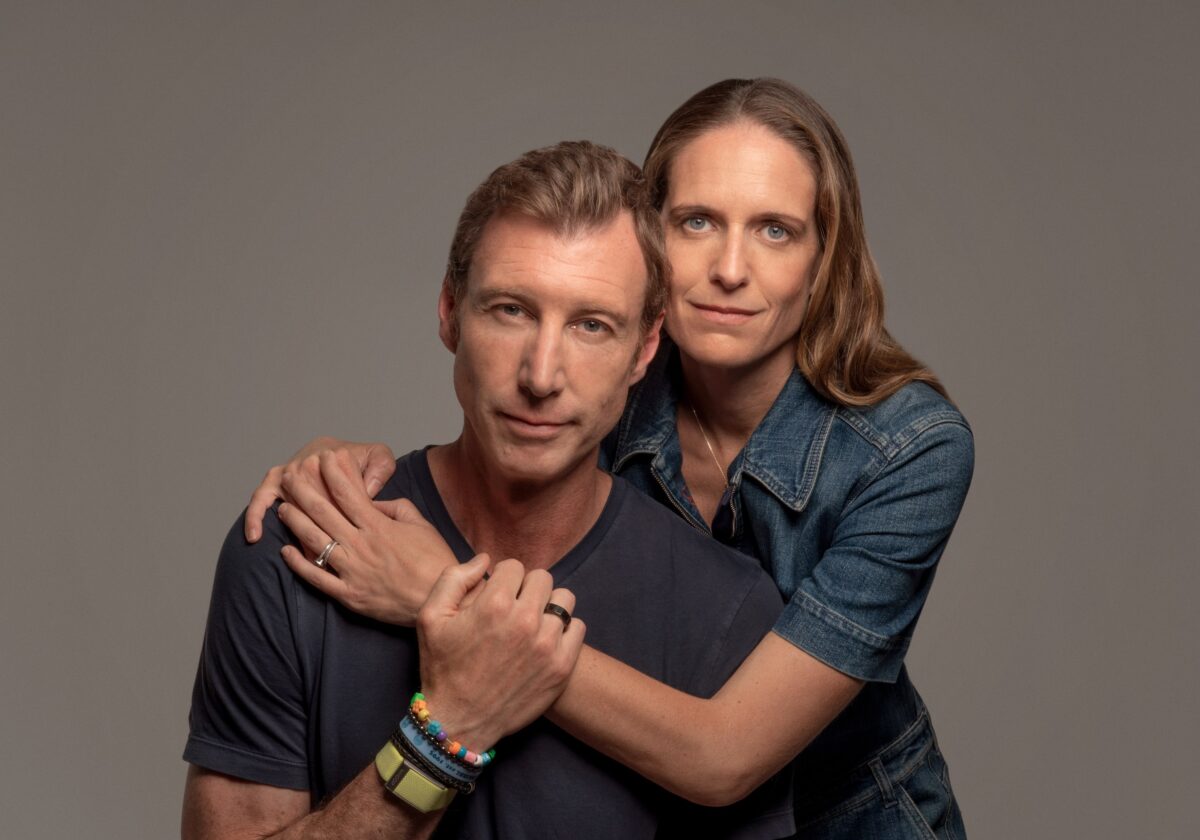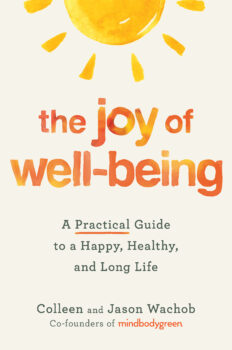


There may be a glut of health information available today, but the best things in life—and health—are free, say mindbodygreen founders Jason and Colleen Wachob. Their new book “The Joy of Well-Being” is a realistic, ultra-practical guide to good health that cuts through the noise of the ever-growing world of wellness.
“We are at the forefront of this health and wellness movement, but we can’t even do these protocols that have a lot of rigidity, and it’s not just because of our life-stage as parents and entrepreneurs. It’s a lot, and it can be overwhelming,” said Colleen.
Too much of health advice is about what one should do or not do, eat or not eat, and when not delivered with a rigidity it’s confusing in its contradictions. Or perhaps the science is fairly clear, but the recommendations are unobtainable.
“The Joy of Well-Being” was two years in the making, and the advice included had to meet three key criteria: backed by science, accessible, and offer the possibility of joy.

In the Wachobs’ view, joy is not just a happy byproduct of one’s wellness journey; instead, it should be a starting point and accompany you throughout the journey. In fact, the first chapter includes this takeaway: “If you only remember one sentence from this book, let it be this one: Any healthy change you make has to be a joyful one.”
“So much of [health and wellness] is about adding and restriction and scarcity. We believe in abundance, and instead of adding, editing and integration,” Jason said. In discussions about longevity, more and more people are focusing on “healthspan” over “lifespan,” and Jason adds that it’s worth looking at “joyspan.”
“What’s the point of living that long and being healthy, fit, and mobile, if you’re not having fun?” he said. There’s a reason gyms call January 13 National Quitter’s Day—that’s how long people hold out to their “healthy” New Year’s resolutions, he added. Jason and Colleen had been busy, active entrepreneurs and executives when they had their own health scares that led to the building of mindbodygreen in 2009.
“Let’s come back to joy,” Jason said. “We feel like our world has gotten a little bit too serious with the biohackers and all of the things—it’s just a little too much.”
The Wachobs offer eight main pieces of advice that can take you to about “80 percent of maximum well-being.” Why 80? Given the health statistics, by any measure, Americans are not healthy, and most of us are only at about 50 percent of good health. At 80 percent, you wake up and feel good about the day, are energized, and will have moment of joy, and know you can move through the world supported by your connections.
Breath, sleep, food, movement, stress, regeneration, connection, and purpose each make up a chapter that includes all the science and statistics, but also the simple, actionable takeaways that can take you to 80 percent health, as well as tips for optimizing you way through that last 20 percent if you so wish.
“The beauty of having been in this business for 14 years and being obsessed with health is that though the science has evolved, so much of the science points to the practices and modalities that require very little time and are low cost or zero cost,” Jason said. The book focuses on the biggest “needle-movers” in health, tips that give you the greatest yield.
“And they tend to be time-tested and a lot more simple than the things that get a lot of airtime on TikTok,” Colleen added.
For instance, the chapter on breath reveals that a startling 50 to 80 percent of adults have dysfunctional breathing patterns, which in turn can ruin your sleep, throw off your psychological stress state, change your blood chemistry, and a whole host of other things that can deteriorate your health.
But the solution? Breathe through your nose. Consciously do so for just a minute or few minutes per day, and you train yourself to automatically do so, even in your sleep, so that you can breathe more easily and enjoy the improved immunity, cardiovascular system, stress management, and other health benefits that come with it.
The rest of the chapters are similarly practical, accessible, science-backed, and can bring joy.
“In the chapter [on stress], we mentioned sauna because there’s a lot of great science on sauna, but look saunas are not that accessible, because buying a sauna is expensive, unless you can get into a gym or YMCA that has one. Unlike cold therapy,” Jason said. “You can hack it with a cold shower.”
When the Wachobs started writing the book, a statistic that stood out to them was that half of Americans reported not having meaningful daily interactions. That was bad enough, but this was a 2019 poll and the numbers had likely gone up during and after the pandemic. Recently, the surgeon general reported that three hours of social media a day doubled the incidence of depression. It has not escaped most people that we are in the midst of a mental health crisis, but the Wachobs have also seen that the trends aren’t all negative. With the growing awareness, more people are taking charge of their health.
“I think we’re at the beginning of what’s going to be an exciting of a tidal wave of reawakening of our relationship to all of these topics, but most importantly redefining and reclaiming how we want to live,” Colleen said.
“We have a series of questions that people can ask themselves [in the book], and one of the ones I think is so important is: What is it that brings you joy? And there’s a lot of times in life when we’re unable to answer that question, but I think getting closer to the things that make your heart sing, that make you realize the uniqueness of the human spirit, that bring us joy, are going to get us closer to the answers,” Colleen said. “And that’s not just how we should be investing our time, but when you do things that bring you joy, you’re more likely to find more community, more people who have shared connections and shared values.”
“So it creates this wonderful impact we call the ‘wellness wave,’ where one small in your body starts to go well, you have this wonderful impact or moment that gains momentum, and other things start to fall into place as well,” Colleen said.
The Wachobs add that the book isn’t meant to be a checklist where one has to do every single one of the tips. Instead, the reader should pick the ones that bring them joy and fit into their lifestyle, and make it their own.
“Make wellness work for you, don’t work for wellness,” Jason said.
“We all deserve to be healthy and happy, and you can do it. It doesn’t have to be time consuming or a pain in the butt. It doesn’t have to be expensive,” Jason said. “There are so many great things you can do for your health. Pick the ones that bring you joy.”
